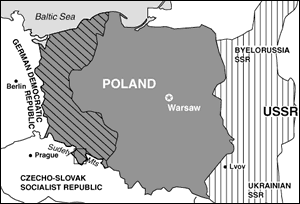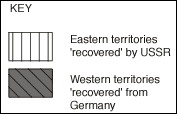 |
 |
||
 |
|||
|
RELATED THEMES identity migration resettlement social relationships OTHER LOCAL THEMES BACKGROUND |
history
Close to the border with the Czech Republic and part of Polish Sudetenland, the Klodzko Valley has had a complex history, which these testimonies bring vividly to life. Over time, Poland's borders have shifted east and west, and this area has been closely connected with the history of three nations: Poland, Germany and former Czechoslovakia. In the inter-war years (1918-1939), the area was German.
After the Second World War, the Klodzko Valley formed part of the territories "recovered" for Poland from Germany. In effect, the country of Poland shifted hundreds of miles to the west and the Valley is now part of its western border zone. Although most of the original German inhabitants were forcibly relocated after the end of Second World War (1945), a few were allowed to stay. These "original" residents have strong memories of a different way of life: varied agricultural conditions and economy, and a distinctly German culture and traditions. This border shift was not simply a change on the map; it also involved massive waves of migration from Poland's former eastern territories (western Ukraine and Byelorussia) which became part of the Soviet Empire. Those Poles who were moved from the 'East' by the Soviet authorities to areas in the west such as the Klodzko Valley were not by any means "returning home". They were made to leave their homelands for an unfamiliar region, and many were full of anxiety and apprehension. For decades, these settlers felt they were only in the area on a temporary basis. However, local history has remained relatively stable for over 50 years, and families that settled after the war have now started to develop roots and local traditions. These testimonies were collected in 1999 and focus mainly on the period from the First World War onwards, the oldest narrator being 86 years old. They cover a most turbulent time in the "heart of Europe". The narrators' varied origins mean their life stories cover much more than the history of this mountain valley - they include vivid descriptions of growing up in the fertile flatlands of Ukraine, and surviving the famine and frozen wastes of the wartime camps of Siberia, as well as occupation by alternating German and Russian forces. (There are too many wonderful and varied quotes to select for this section - the testimonies need reading in their entirety.) Today, life is more settled but changes in national history continue to affect the area's political traditions and economy. The decline of communism has had considerable impact, bringing about the restructuring of the local economy and agriculture. The Valley's relative isolation from urban concerns and the political mainstream made it attractive to those political "refugees" (intelligentsia déclassé) who chose to abandon public life during the communist era. Their migration to the area has had a continuing effect on the Klodzko Valley, bringing new ideas, organisational experience and political acumen. Farming is currently in decline, but many of the intelligentsia déclassé are staying, and putting their previous experience to good use, setting up or supporting local initiatives and organisations. quotes about history""That was established by governments between themselves: where the borders would be, who would settle and who had to leave. Immediately after the war . That surely wasn't easy for anyone." " ""In 1952, those people who were driven away from Silesia, they analysed their situation, the lives of [those in similar circumstances], and they decided to write a Charter so that no-one in the world [would have] to go through similar ordeals.... They declared in the Charter that they would be working towards uniting Europe, so that the borders get [abolished], so that the ruling powers could never chase away anyone from their homeland.... I would like to tell young people to discard false history and try to look for the truth in the world on their own.... to see for themselves what people are like, that they are the same, that they should love them. So that there were no political differences."" |
|||||

